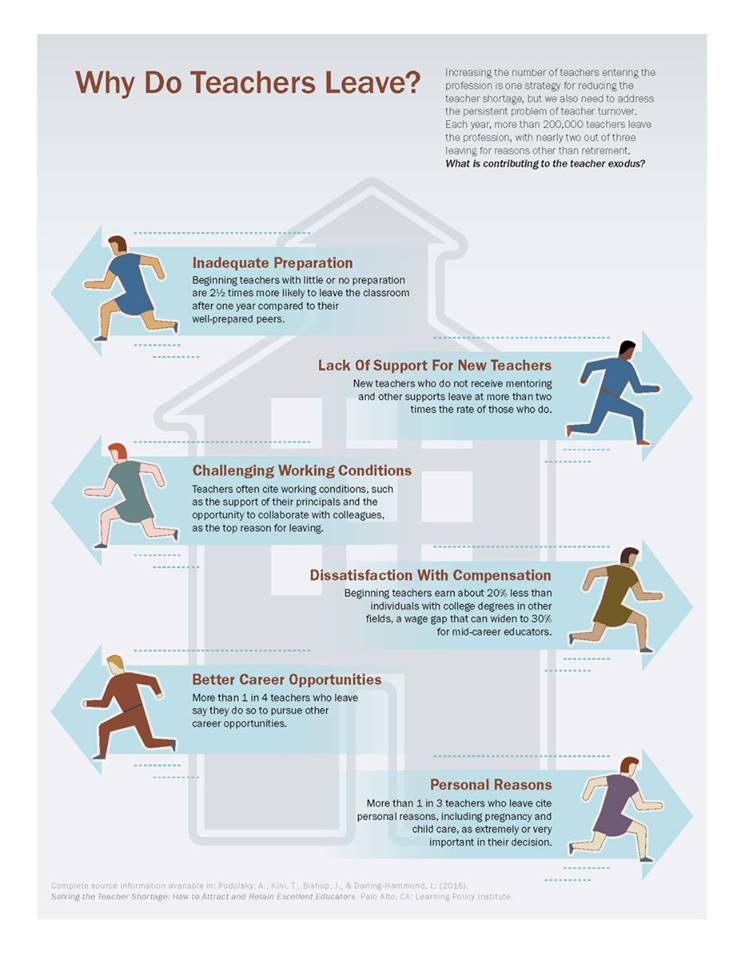Unfortunately, some school districts in Tennessee will begin the school year still needing to hire teachers to staff their schools. Statistically, our Colleges of Education are not graduating the number of students necessary to replace teachers who have left the field, either voluntarily or involuntarily. A recent infographic from the Learning Policy Institute illustrates the issue and makes it easy to understand. The chart clarifies the top reasons educators indicate why they leave the profession.
 The Learning Policy Institute identified inadequate preparation, lack of support, challenging working conditions, dissatisfaction with compensation, better career opportunities, and personal reasons for why teachers change careers. From our own internal surveys “high-stakes standardized testing” is the number one issue educators’ mention to us is why they are dissatisfied with the profession. In addition, there is no longer a “freedom to teach,” if it falls outside of what is on a test or in the standards.
The Learning Policy Institute identified inadequate preparation, lack of support, challenging working conditions, dissatisfaction with compensation, better career opportunities, and personal reasons for why teachers change careers. From our own internal surveys “high-stakes standardized testing” is the number one issue educators’ mention to us is why they are dissatisfied with the profession. In addition, there is no longer a “freedom to teach,” if it falls outside of what is on a test or in the standards.
Educators understand the need to measure their impact on a child they have taught, but feel like it cannot be isolated strictly to a test. Teachers do not fear being held accountability for their work, but they believe it is unfair to hold them accountable for the work of their colleagues. That is understandable. And when their livelihood and career are subjected on the results of a single test, it is disheartening for those on the frontlines. I was “tired of feeling like I was in a no win situation” said one former teacher. Teachers must have a greater voice in their profession and shaping education policy.
A highly esteemed East Tennessee educator tells us, “The home environments are getting so horrible for some of these kids — they come to school numb. And we are supposed to make them care about standardized testing? That’s 28 years of teaching and seeing the decline talking there.”
Connect the lack of parental engagement with a lack of resources in a school, perhaps mediocre school leadership and/or frequent changing of administration, this merely adds to the teacher stress level. Other stressors include frivolous and unnecessary staff meetings, increased paperwork, state regulations and unclear board policies, augmented workload with special needs students and students who do not speak English, class size, multiplied discipline problems, lack of classroom materials and, in some cases, “12-14 hour days 7 days a week work” and you can understand the burnout.
While compensation is always an issue in any field, it ranked 10th in our survey for what teachers felt were critical priorities. People rarely go into teaching for the money. Lack of Respect was the 3rd most common issue educators wanted addressed. That lack of respect for the profession was one of the major reasons we worked closely with Senator Mark Green, Senator Jim Tracy and Representative Jay Reedy to create the Teacher Bill of Rights. We felt it was a needed step to regain a culture of respect that has been lost. The state legislature supported the legislation unanimously, and Governor Haslam signed it into law.
While mandating parental support is unlikely, we can work on restoring some discipline back into our schools. You simply cannot regulate someone into being a responsible parent, no matter how much you may like. On the other hand, a recent article on why teachers leave the field, educators reported that they feel micro-managed by both administrators and parents. One commentator stated she was “frustrated by lawnmower parents, who expect their child to get an ‘A’ when they are only doing ‘C’ work.”
The media could play a critical role in not only informing parents of key education issues, but perhaps introducing parental advice on issues such as child rearing and how to appropriately engage in a child’s education. For example, Fox News 17 in Nashville has reported on some incredible education stories in 2017. Harriet Wallace hosted a great series on Bullying. Morning News Anchor, A. J. Hilton, regularly features incredible community and education issues related to teachers and children.
Teachers are the key people educating the next generation. Parental engagement is crucial. We must do a better job attracting people to teaching. But the easiest thing to do is to quit driving away those educators who are already on the frontlines. If we don’t address some of these issues quickly, we will see even more educators leave the profession.
– – –
JC Bowman is the Executive Director of Professional Educators of Tennessee, a non-partisan teacher association headquartered in Nashville, Tennessee. Permission to reprint in whole or in part is hereby granted, provided that the author and the association are properly cited. Follow him on social media via Twitter at @jcbowman.


Until we get back to teaching the real basics and until we have good two parent homes that actively teach character, discipline, and moral principles, the children will have a tough time in schools. I know many teachers who work their hearts out, but know what I am saying is true. The home and the school works best when they work together for the good of the child. Last, church is the third important part to a child’s successful training with good solid religious instruction.It takes all three God given institutions, home,school, and church for a child to be successful.
It seems to me you are really addressing two separate issues. The info graphic gives reasons for why teachers leave. The number one reason listed is inadequate preparation for the teaching profession. Teaching is a profession that requires a high level of skill and knowledge to master. When more and more teachers are coming into education via alternative licensures, they are not given the full range of teacher education. Instead, many come into teaching with ‘quickie’ preparation programs of six to eight weeks. (Imagine a quickie education program for a nurse or doctor!) The second item you are addressing is teacher dissatisfaction. Teachers who remain in the classroom feel overburdened by excessive testing and being held accountable for items outside their scope of influence. This leads to fewer and fewer teachers entering teacher preparation programs which leads to a need for alternative licensing programs. It is a vicious and unhealthy cycle with students as the losers. At a minimum based on our current reality, we need to provide new teachers with individualized, high quality coaching and lessen the emphasis on high stakes testing.